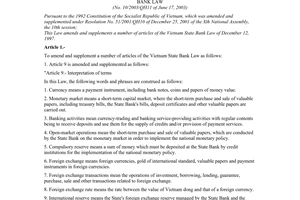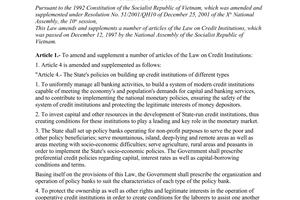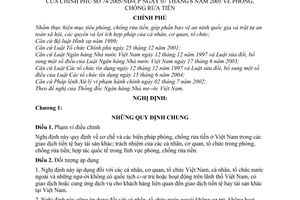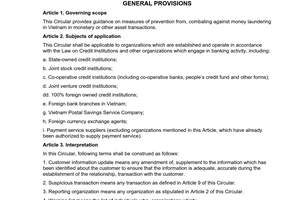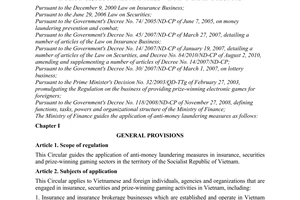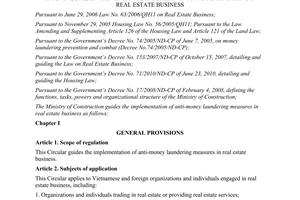Decree No. 74/2005/ND-CP of June 7, 2005, on prevention and combat of money laundering. đã được thay thế bởi Decree No. 116/2013/ND-CP detailing Law on prevention and combat of money laundering và được áp dụng kể từ ngày 10/10/2013.
Nội dung toàn văn Decree No. 74/2005/ND-CP of June 7, 2005, on prevention and combat of money laundering.
|
THE GOVERNMENT |
SOCIALIST REPUBLIC OF VIETNAM Independence-Freedom-Happiness |
|
No.74/2005/ND-CP |
Hanoi, June 7, 2005 |
DECREE
ON PREVENTION AND COMBAT OF MONEY LAUNDERING
THE GOVERNMENT
In order to achieve the objective of prevention and combat of money laundering, contributing to safeguarding national security and social safety and order and protecting legitimate rights and interests of individuals, agencies and organizations;
Pursuant to the 1999 Penal Code;
Pursuant to the December 25, 2001 Law on Organization of the Government;
Pursuant to the December 12, 1997 Law on the Vietnam State Bank and the June 17, 2003 Law Amending and Supplementing a Number of Articles of the Law on the Vietnam State Bank;
Pursuant to the December 12, 1997 Law on Credit Institutions and the June 15, 2004 Law Amending and Supplementing a Number of Articles of the Law on Credit Institutions;
Pursuant to the July 2, 2002 Ordinance on Handling of Administrative Violations;
At the proposal of the Vietnam State Bank Governor,
DECREES:
Chapter I .
GENERAL PROVISIONS
Article 1. Scope of regulation
This Decree provides for mechanisms and measures to prevent and combat money laundering in Vietnam in monetary or other property transactions; responsibilities of individuals, agencies and organizations for preventing and combating money laundering; and international cooperation in the prevention and combat of money laundering.
Article 2. Subjects of application
1. This Decree applies to Vietnamese individuals, agencies and organizations, foreign individuals and organizations and stateless persons residing or operating in the Vietnamese territory who conduct monetary or other property transactions or provide customers with services related to such transactions in Vietnam.
2. This Decree also applies to foreign individuals or organizations who do not reside or operate in the Vietnamese territory but conduct monetary or other property transactions or provide customers with services related to such transactions in Vietnam.
3. In cases where international treaties which the Socialist Republic of Vietnam has signed or acceded to contain provisions different from those of this Decree, the provisions of such international treaties shall apply.
Article 3. Interpretations of terms
1. Money laundering means acts committed by individuals or organizations to legitimize money or property acquired from criminal activity through the following specific activities:
a/ Directly or indirectly participate in a transaction related to money or property acquired from criminal activity;
b/ Receiving, appropriating, moving, converting, transferring, transporting, using or transporting across borders money or property acquired from criminal activity;
c/ Investing in a project or work, contributing capital to an enterprise or otherwise concealing or disguising, or obstructing the verification of the origin, the truth or the location, movement process or ownership of, money or property acquired from criminal activity.
2. Financial institution means any organization dealing in one or more than one of the following activities: acceptance of deposits; lending; financial hire and purchase; transmission of money or value; issuance and management of payment instruments; financial guarantee and commitment; foreign exchange dealings; money market instruments, transferable securities; participation in issuance of securities; management of investment portfolios of individuals and collectives; administration of cash or liquid securities on behalf of other individuals or collectives; investment, management of capital or money on behalf of other individuals or collectives; life insurance and other investment- related insurance; money changing.
3. Monetary or other property transactions (hereinafter collectively referred to as transactions) mean transactions resulting in the transformation, movement or change in the ownership of money or property of individuals, agencies or organizations.
4. Customer identification means necessary procedures carried out in accordance with the provisions of this Decree in order to obtain information concerning individuals or organizations conducting monetary or other property transactions.
5. Identification information means information obtained under Clause 3, Article 8 of this Decree and used for identifying the parties involved in, purposes and nature of, transactions.
6. Competent state agencies mean any state agencies having the function of managing, directing, guiding, collecting information, investigating or handling money laundering-related acts under the provisions of this Decree.
7. Suspicious transactions mean any transactions showing abnormal signs or related to money laundering, which are warned by competent state agencies or identified under the provisions of this Decree.
Article 4. Principles of prevention and combat of money laundering
1. The prevention, detection, stoppage and handling of money laundering must comply with legal provisions on the basis of ensuring national sovereignty and security; securing normal economic and investment activities; protecting legitimate rights and interests of individuals, agencies and organizations; combating abuse of powers and taking advantage of the prevention and combat of money laundering to infringe upon legitimate rights and interests of the concerned individuals, agencies and organizations.
2. International cooperation in the field of prevention and combat of money laundering must abide by the principles of respect for national independence and sovereignty; mutual benefit and compliance with the provisions of Vietnamese law, unless otherwise provided for by international treaties to which the Socialist Republic of Vietnam has signed or acceded.
Article 5. Responsibilities for participating in the prevention and combat of money laundering
1. To prevent and combat money laundering is the responsibility of all individuals, agencies and organizations.
2. Agencies, organizations and individuals are strictly prohibited from participating in or facilitating money laundering activity.
3. The State shall adopt policies to encourage and protect individuals, agencies and organizations participating in preventing and combating money laundering; encourage organizations and individuals that have committed acts of money laundering to give themselves up or report to competent state agencies; and organize the fight against money laundering-related offenses.
Article 6. Individuals and organizations responsible for preventing and combating money laundering
1. Financial institutions responsible for taking measures to prevent and combat money laundering under the provisions of this Decree include:
a/ Institutions established and operating under the provisions of the Law on Credit Institutions;
b/ Organizations engaged in monetary brokerage, investment or providing payment services in the Vietnamese territory;
c/ Organizations issuing, listing, transacting, trading in, putting into custody or making clearing payment of, securities;
d/ Registered foreign-currency, gold, silver or gem business organizations;
e/ Insurance, insurance brokering companies, and organizations conducting activities related to pension, welfare, economic or social programs;
f/ Vietnam-based organizations operating on behalf of or representing foreign financial institutions.
2. Other individuals and organizations responsible for preventing and combating money laundering under the provisions of this Decree include:
a/ Lawyers, legal counseling firms, lawyers offices, law partnerships when they conduct monetary or other property transactions on behalf of their clients;
b/ Organizations dealing in luck games, casinos or lotteries; business organizations offering big sale promotion prizes to customers;
c/ Registered real estate business service companies;
d/ Individuals licensed to operate or do business like any of financial institutions stated in Clause 1 of this Article.
Chapter II .
ANTI-MONEY LAUNDERING MEASURES
Article 7. General preventive measures
1. Financial institutions stated in Clause 1, Article 6 of this Decree shall be responsible for implementing the following measures:
a/ To formulate internal control and audit processes to ensure effective prevention and combat of money laundering in accordance with current provisions of law;
b/ To arrange personnel responsible for implementing anti-money laundering policies, plans, processes and measures;
c/ To develop processes of obtaining and updating information and procedures for identifying clients under the provisions of Article 8 of this Decree;
d/ To keep and update statistics and report transactions under the provisions of Article 12 of this Decree;
e/ To promptly satisfy the requests of competent state agencies and collaborate with other individuals, agencies and organizations in preventing and combating money laundering;
f/ To train personnel in order to raise their responsibility for preventing and combating money laundering;
g/ To apply according to their competence provisional measures provided for in Article 11 of this Decree.
2. Individuals and organizations stated in Clause 2, Article 6 of this Decree shall have to implement the provisions of Points c, d, e, g, Clause 1 of this Article.
Article 8. Client identification
1. Cases where client identification is required under the provisions of this Decree include:
a/ Clients being individuals or organizations open accounts for the first time;
b/ There arise cash transactions stated in Article 9 of this Decree;
c/ Transactions show suspicious signs as provided for in Article 10 of this Decree;
d/ Depending on the nature and size of transactions, individuals and organizations stated in Article 6 of this Decree find it necessary to identify clients.
2. Requirements on client identification:
a/ Ensuring the reliability and timeliness of client identification information;
b/ Ensuring confidentiality of identification information for clients.
3. Contents of client identification information:
Individuals and organizations stated in Article 6 of this Decree shall be responsible for designing by themselves client identification forms, containing the following details:
a/ Date, month and year of opening the account or conducting the transaction;
b/ Full name of the individual or representative of the agency or organization wishing to conduct the transaction; the serial number of the passport, peoples identity card or another personal identity paper; address of place of residence or registration of permanent residence;
c/ Full and abbreviated transaction names, business registration number, tax payment registration number, address of the head office of the organization or owner wishing to conduct the transaction or having authorized the transaction to a third party;
d/ Transaction names, addresses, numbers of the identity cards or business registration numbers of the individuals or organizations involved in the transaction, especially the transaction-authorizing party and the beneficiary in the transaction;
e/ Form, purpose and value of the transaction;
f/ Full name of individual or staff performing the client identification.
4. Measures to identify clients:
In case of doubting client identification information supplied by clients, individuals or organizations stated in Article 6 of this Decree shall verify the truthfulness of such information by:
a/ Investigating and gathering information from other organizations which had or have relations with clients and comparing such information with information supplied by clients;
b/ Gathering information from branches, representative offices, subsidiary or dependent companies, etc., in the places from which information supplied by clients originates;
c/ Verifying information through competent agencies from which information supplied by clients originates;
d/ Other measures compliant with law and satisfying customer identification requirements.
5. Preservation of client identification information:
Apart from preserving information according to current regulations, individuals and organizations stated in Article 6 of this Decree shall be responsible for keeping client identification information relating to transactions specified in Clause 1 of this Article for at least 5 years as from the date of closing of accounts or completion of transactions.
Article 9. Value levels of transactions subject to reporting according to regulations
1. One or more than one transaction conducted in a day by an individual or organization in cash with an aggregate value of VND 200,000,000 (two hundred million) or more or of equivalent value for foreign currencies or gold, unless otherwise provided for by law.
2. For savings transactions, one or more than one transaction conducted in a day by an individual or organization in cash with the aggregate value of VND 500,000,000 (five hundred million) or more or of equivalent value for foreign currencies or gold.
3. The Prime Minister shall adjust the value levels of cash transactions subject to reporting provided for in Clauses 1 and 2 of this Article to suit the national socio-economic development situation in each period.
Article 10. Suspicious transactions
1. Transactions shall be deemed suspicious when showing one of the following signs:
a/ The parties involved in transactions supply inaccurate, incomplete and inconsistent information or persuade service-providing individuals or organizations not to report transactions to competent state agencies according to the provisions of law;
b/ Transactions conducted under orders or authorization of individuals or organizations related to criminal activities on the warning list made by the Public Security Ministry in order to prevent and combat money laundering and combat the use of money or property to facilitate or finance criminal activities inside or outside the Vietnamese territory;
c/ Transactions with their involved parties being detected, through identification information or scrutinizing their economic and legal grounds, to have relationships with criminal activity or with individuals or organizations stated at Point b, Clause 1 of this Article;
d/ Individuals and organizations enter into transactions with large amounts of money incommensurate with or not related to their routine activities or any lawful activities;
e/ There are sudden changes in transaction turnovers on accounts; money deposited in and withdrawn quickly from accounts; transaction turnover is big in the day but the account balance is negligible or zero;
f/ Transactions of transferring small amounts of money from different accounts into a large amount of money or through different accounts to a single account within a short period or vice versa; money crookedly transmitted through many accounts; the involved parties do not care about transaction charges;
g/ Letters of credit and other commercial financing instruments of high value and at high discounts are used to transfer money between countries while these transactions are not related to routine activities of clients;
h/ Legal persons fail to conduct transactions for a long time on their accounts as from the time of opening of such accounts; domestic enterprises open and use overseas accounts under the names of foreign legal persons or entities;
i/ Large amounts of money are transmitted from enterprises foreign-currency accounts to abroad after many small amounts of money are remitted into such accounts by means of electronic transfers, checks or drafts;
j/ Foreign enterprises transmit money abroad immediately after receiving investment capital or make payments to abroad not suitable to the nature or demands of their business;
k/ Insurance companies regularly pay indemnities or insurance sums in large amounts of money to the same client;
l/ Securities organizations transmit money not in compatibility with their securities trading activities;
m/ Any other transactions which financial institutions deem abnormal or having unreliable legal grounds.
2. The list of suspicious transactions shall be added periodically in a separate document after consulting the concerned ministries and branches.
3. Individuals or organizations stated in Article 6 of this Decree shall be responsible for keeping abreast of the list stated at Point b, Clause 1 of this Article for knowledge and implementation.
Article 11. Provisional measures to be applied to preventing and combating money laundering
1. In the process of preventing and combating money laundering, one of the following provisional measures may be applied:
a/ Not to effect transactions;
b/ To block accounts;
c/ To seal up or seize property;
d/ To seize violators;
e/ Other preventive measures provided for by law.
2. The application of provisional measures must be applied according to the right competence, the provisions of law, without affecting the safety of the financial and monetary system.
3. Individuals and organizations stated in Article 6 of this Decree shall be entitled to apply the measure of not effecting transactions when the parties involved therein are on the list stated at Point b, Clause 1, Article 10 of this Decree or when they have grounds to believe that the transactions requested to be effected are related to criminal activity, and at the same time immediately report thereon to the anti-money laundering information center or competent state agencies; block accounts at the request of competent state agencies.
4. Competent investigating agencies may apply measures of: blocking accounts, sealing up or seizing property, seizing violators and other preventive measures as provided for by law.
Article 12. Forms and contents of reporting and supply of information
1. Individuals and organizations stated in Article 6 of this Decree must report transactions specified in Articles 9 and 10 of this Decree to the anti-money laundering information center or competent state agencies, specifically as follows:
a/ Form of reporting: in writing, by electronic means or any lawful mode; in case of necessity, prompt reporting via telephone is acceptable but confirmation by one of the above-said modes is required thereafter; persons who make or sign such reports must be the very individuals who have effected the transactions or responsible officials or competent persons of the organizations or agencies required to report;
b/ The contents of a report include: client identification information provided for in Clause 3, Article 8 of this Decree; time and time limit for effecting the transaction or issuing a transaction order; parties involved in the transaction; papers and documents used by the involved parties in the transaction; preventive measures already taken;
c/ Reporting time: Within 48 hours as from the time when transactions defined in Article 9 arise or from the time when transactions defined in Article 10 of this Decree are detected or within 24 hours if traces of relationship between the requested transactions and criminal activity are detected. The Vietnam State Bank Governor shall stipulate the reporting time for each specific type of transaction.
2. Individuals, agencies and organizations stated in Article 6 of this Decree are not allowed to notify the parties involved in transactions of the reporting and reporting contents or supplied information.
3. Other individuals, agencies and organizations, if detecting suspicious transactions, may denounce them, supply information on or inform them in writing or by another lawful mode to the anti-money laundering information center or competent state agencies. Competent state agencies that receive the above-said denunciations or information shall be responsible for processing information according to their competence provided for by law and immediately notify the anti-money laundering information center thereof.
4. Information related to transactions reported under this Decree shall be kept confidential according to regulations and may be only supplied to competent agencies according to the provisions of law. Individuals, agencies and organizations that perform the duty of reporting or supplying information relating to transactions under the provisions of Clause 1 of this Article shall not be considered having violated the provisions of law on ensuring confidentiality of deposited money and property of clients or other regulations on ensuring confidentiality of information for clients.
Article 13. Processing of information
1. Upon receiving information or reports on transactions defined in Articles 9 or 10 of this Decree, the anti-money laundering information center shall:
a/ Analyze the information or reports;
b/ Compare the information and reports with statistical data and information available and information kept at the center;
c/ Request or propose any individuals, agencies or organizations to supply additional information and data relating to the received reports;
d/ Issuing warnings or making recommendations to individuals and organizations stated in Article 6 of this Decree and the concerned competent state agencies regarding matters arising from the reported transactions.
2. When having grounds to determine that the transactions mentioned in the information or reports are possibly related to criminal activity, the anti-money laundering information center shall immediately notify the competent investigating agencies thereof, transfer the whole dossiers to them, and, at the same time, closely collaborate with the investigating agencies in the process of verifying the details of the cases and supply information and documents related thereto when so requested.
Article 14. The anti-money laundering information center
1. To set up the anti-money laundering information center under the Vietnam State Bank, which shall function as the sole body to receive and process information; have the right to request related agencies, organizations and individuals to supply documents and records of information concerning transactions defined in Articles 9 and 10 of this Decree; supply documents and information under the provisions of this Decree; and assist the Vietnam State Bank Governor in performing the tasks defined in Article 15 and Clauses 1 and 4, Article 20 of this Decree.
2. The anti-money laundering information center has a director and several deputy directors appointed by the Vietnam State Bank Governor.
3. The anti-money laundering information center has its own seal and headquartered at the premises of the Vietnam State Bank.
4. The functions, specific tasks, powers, organizational structure and working regime of the anti-money laundering information center shall be stipulated by the Vietnam State Bank Governor.
Chapter III.
RESPONSIBILITIES OF STATE AGENCIES FOR PREVENTING AND COMBATING MONEY LAUNDERING
Article 15. Responsibilities of the Vietnam State Bank
1. To assume the prime responsibility for, and coordinate with the Public Security Ministry and concerned agencies in, formulating and implementing strategies, guidelines, policies and plans on the prevention and combat of money laundering in the Vietnamese territory; study and work out measures to limit cash payment in the Vietnamese territory.
2. Annually or upon request of the Government, to share the results of the prevention and combat of money laundering with the concerned agencies and sum them up for reporting to the Government.
3. To coordinate with the concerned agencies, organizations and individuals in taking anti-money laundering measures in accordance with the provisions of law and this Decree.
4. To organize receipt, sum-up, analysis, processing, keeping and supply of information, documents and records under the provisions of Articles 12 and 13 of this Decree; transfer to competent state agencies documents and dossiers of cases possibly related to money laundering for inspection, investigation and handling according to the provisions of law.
5. To organize research and application of scientific, technical and technological advances to processing information relating to anti-money laundering;
6. To train specialized personnel of the related units of the Vietnam State Bank and financial institutions in analyzing and processing information and detecting money laundering.
Article 16. Responsibilities of the Public Security Ministry
1. To assume the prime responsibility for, and coordinate with the concerned agencies, organizations and individuals in preventing and combating money laundering-related offenses; organize receipt and processing of information on money laundering-related offenses.
2. To assume the prime responsibility for, and coordinate with the concerned agencies, organizations and individuals in, popularizing and educating in the prevention and combat of money laundering.
3. To organize forces to investigate money laundering-related offenses; guide other agencies to conduct preliminary investigations of money laundering-related offenses according to the provisions of criminal procedure law and this Decree; inform the findings of the investigations of money laundering-related cases to the Vietnam State Bank.
4. To exchange necessary information and documents on new techniques employed by criminals in money laundering activities at home and abroad with the Vietnam State Bank through the anti-money laundering information center.
5. To train and foster personnel engaged in investigating, preventing and combating money laundering-related offenses.
Article 17. Responsibilities of ministries, ministerial-level agencies and Government-attached agencies
1. To guide and supervise units under their respective management to implement the provisions of this Decree.
2. Within the scope of their law-prescribed powers, to collaborate in time with competent state agencies and other individuals, agencies and organizations in preventing and combating money laundering.
3. To collaborate with and support the agencies of the Public Security Ministry, the Supreme Peoples Procurer and the Supreme Peoples Court in investigating, prosecuting and adjudicating money-laundering offenses.
4. Before December 31 every year, to sum up the work of prevention and combat of money laundering in the fields under their respective management; send reports thereon to the Vietnam State Bank for sum-up and submission to the Government.
Article 18. Responsibilities of ministerial inspectorates
1. To notify the anti-money laundering information center or competent state agencies of received or detected information and reports on transactions defined in Articles 9 and 10 of this Decree and keep relevant information and records for at least 5 years.
2. To supply fully and in time information at the request of the anti-money laundering information center and competent investigating, prosecuting or adjudicating agencies.
3. To inspect and supervise units subject to management by their ministries or branches when they have money laundering-related transactions at the request of the anti-money laundering information center or competent state agencies.
4. To handle according to their competence acts of administrative violation under the provisions of the Ordinance on Handling of Administrative Violations and this Decree.
Article 19. Responsibilities of Peoples Committees at all levels
1. To guide their subordinate units and sections to study and implement the provisions of this Decree within the scope of their respective functions and tasks.
2. To closely collaborate with competent state agencies in implementing, and urging the implementation of, anti-money laundering policies, line, strategies and plans.
Chapter IV.
INTERNATIONAL COOPERATION IN THE PREVENTION AND COMBAT OF MONEY LAUNDERING
Article 20. Responsibilities of state agencies for international cooperation in the prevention and combat of money laundering
1. The Vietnam State Bank shall act as the sole agency for negotiating, concluding and implementing international treaties and agreements on the exchange of information on transactions suspected to be related to money laundering.
2. The Public Security Ministry shall be responsible for negotiating and concluding international treaties on judicial assistance, extradition and cooperation in the prevention and combat of money laundering-related offenses; organizing the implementation of guidelines, policies and international treaties on the prevention and combat of money laundering-related offenses.
3. Upon receiving requests for international cooperation related to the prevention and combat of money laundering, competent state agencies shall have to promptly notify the Vietnam State Bank (if such requests are related to cooperation in information exchange stated in Clause 1 of this Article) or to the Public Security Ministry (if such requests are related to legal and judicial assistance stated in Clause 2 of this Article) of the nature, content, time, the involved parties and other cooperation programs related to money laundering, and reasons for refusing judicial assistance requests for sum-up and coordinated implementation.
4. The Vietnam State Bank and the Public Security Ministry shall have to provide guidance on the compliance with international cooperation requests to agencies participating in international cooperation in the prevention and combat of money laundering.
Article 21. Forms and contents of requests for international cooperation in the prevention and combat of money laundering
1. Forms of cooperation:
a/ Collaborating in detecting and stopping money laundering under legal provisions of Vietnam and the related countries;
b/ Concluding multilateral and bilateral international treaties on the prevention and combat of money laundering-related offenses;
c/ Collecting, studying and exchanging information and experience concerning the prevention and combat of money laundering offenses;
d/ Collaborating in training and fostering personnel of the concerned agencies and organizations in skills of analyzing reports and information on suspicious transactions and in investigating, prosecuting and adjudicating money laundering-related offenses;
e/ Collaborating in organizing meetings and seminars on matters related to the prevention and combat of money laundering offenses;
f/ Complying with requests for judicial assistance in the investigation and handling of money laundering-related offenses committed by foreign individuals or organizations in Vietnam or Vietnamese individuals or organizations abroad;
g/ Providing supports in terms of material base, technique, technology and legal capacity building in the prevention and combat of money laundering.
2. Modes and contents of cooperation requests:
a/ Cooperation requests must be sent in writing, signed by responsible persons and stamped by competent authorities of the requesting countries;
b/ Depending on their contents, written cooperation requests shall be sent to the Vietnam State Bank via the anti-money laundering information center or to the Public Security Ministry via the Vietnam INTERPOL Office.
c/ In emergency cases, cooperation requests may be sent by communication means then confirmed in writing according to the provisions of Point a, Clause 2 of this Article within 5 subsequent working days;
d/ A written cooperation request must contain the following details: names of the requesting and request-receiving organizations and countries; purpose, nature and time limit of the assistance request; identity characteristics of assets or offenders to facilitate the compliance with the cooperation request; copies of evidences or final judgments of competent authorities of the requesting country.
Article 22. Refusal of judicial assistance requests
1. Competent Vietnamese state agencies shall refuse to satisfy judicial assistance requests if:
a/ The requests cause harms to the sovereignty, national security or other important interests of Vietnam;
b/ The requests do not conform with international treaties which the Socialist Republic of Vietnam has signed or acceded to and Vietnamese laws.
2. Competent Vietnamese state agencies may refuse to comply with judicial assistance requests if:
a/ The requests fail to meet the conditions specified in Article 21 of this Decree;
b/ Individuals mentioned in the requests have been or are being investigated, prosecuted, adjudicated or convicted by competent Vietnamese state agencies for money laundering-related offenses under Vietnamese laws.
3. Competent Vietnamese state agencies which refuse to comply with judicial assistance requests shall inform competent authorities of the requesting countries of their refusal.
Chapter V
COMMENDATION AND HANDLING OF VIOLATIONS
Article 23. Commendation
Individuals, agencies and organizations that make achievements in the prevention and combat of money laundering shall be commended and/or rewarded under the provisions of law.
Article 24. Handling of violations
1. Those who commit money laundering-related offenses shall be handled under the Penal Code of the Socialist Republic of Vietnam.
2. If individuals or organizations responsible for the prevention and combat of money laundering violate the provisions of this Decree but not seriously enough for penal liability examination, they shall be subject to administrative sanctions as follows:
a/ Caution, for having no internal control and audit regulations containing articles on the prevention and combat of money laundering; having no staff responsible for implementing anti-money laundering measures; having no processes of obtaining information on and procedures for identifying clients under the provisions of this Decree;
b/ Fines of between VND 5,000,000 (five million) and VND 15,000,000 (fifteen million) for failure to inform or report to the anti-money laundering information center or competent state agencies according to the provisions of Article 12 of this Decree; failure to keep books, records and documents related to transactions within the time limit stated in this Decree; failure to report to the anti-money laundering information center or competent state agencies on errors they detect in the records, documents and books already transferred to these agencies;
c/ Fines of between VND 10,000,000 (ten million) and 30,000,000 (thirty million) for notifying the involved parties of the contents of reports or information supplied under Article 12 of this Decree; postponing the compliance with or failing to comply with the requests of the anti-money laundering information center or competent state agencies according to the provisions of this Decree without plausible reasons;
d/ Apart from being subject to caution or fines, the violating individuals or organizations may be deprived of the right to use their operation licenses or practice certificates they have used in the commission of violations for a definite or indefinite period; and the material evidences and means used for the commission of violations shall be confiscated under the provisions of the Ordinance on Handling of Administrative Violations.
3. Those who abuse their positions and powers to violate the provisions of this Decree while performing their duties in preventing and combating money laundering shall, depending on the nature and seriousness of their violations, be disciplined or examined for penal liability; if causing damage, they shall have to pay compensation for according to the provisions of law.
Article 25. Complaints, denunciations
The lodging and settlement of complaints and denunciations related to administrative decisions or acts related to the handling of violations of the law on the prevention and combat of money laundering shall comply with the provisions of law on complaints and denunciations.
Chapter VI
IMPLEMENTATION PROVISIONS
Article 26. Implementation effect
This Decree takes effect as from August 1, 2005.
Article 27. Implementation responsibilities
1. The Vietnam State Bank Governor and the Public Security Minister shall, within the ambit of their respective functions and tasks, have to guide the implementation of this Decree.
2. The ministers, the heads of the ministerial-level agencies, the heads of the Government-attached agencies, and the presidents of the Peoples Committees of provinces and centrally-run cities shall have to implement this Decree.
|
|
ON BEHALF OF THE GOVERNMENT
Phan Van Khai |





